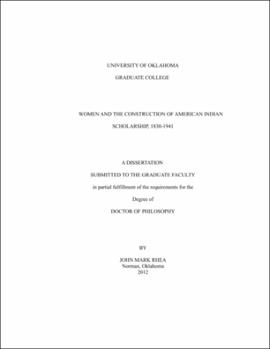| dc.contributor.advisor | Hurtado, Albert||Wrobel, David | |
| dc.creator | Rhea, John Mark | |
| dc.date.accessioned | 2019-04-27T21:36:31Z | |
| dc.date.available | 2019-04-27T21:36:31Z | |
| dc.date.issued | 2012 | |
| dc.identifier | 99335224002042 | |
| dc.identifier.uri | https://hdl.handle.net/11244/319138 | |
| dc.description.abstract | Between 1830-1941 a select group of European American women's rights proponents crafted a body of American Indian scholarship through which they were able to exercise an extraordinary degree of social and political influence. That much of this scholarship was written before women gained the right to vote and when few had advanced degrees or professional positions suggests its avant-garde nature. During the one hundred and eleven years addressed by this study, these women played a key role in the appropriation and construction of Indian scholarship. | |
| dc.description.abstract | The pre-professional era (1830-1890) facilitated European American women's American Indian research and expertise as Indian scholars. Professionalization would quickly erode the political and scholarly status this work afforded. More damning, Professional anthropologists and historians would eventually call into question the racial theories that underpinned women's Indian scholarship. In destabilizing racial evolution professional anthropologists and historians also altered the historical narrative of the American West. | |
| dc.description.abstract | This reconfiguration would remake the western conquest into a tale of inevitable and beneficial European American progress. The earlier work of women Indian scholars would not find a niche within this new history. In turn the scholarship of western frontier settlement would become the specialty of professional male historians. Largely ignored by male colleagues, Indian history would be taken up again by an emerging cadre of marginalized professional women historians. Retooled as a non-partisan study of Indian treaties and legal relations with the United States, the new Indian political history would become identified with women historians. | |
| dc.description.abstract | As autonomous professional women scholars had done three decades before, professional women historians (1890-1929) appropriated American Indian history and inscribed it with new meaning. In a move that increased their own professional stature, women historians took up Indian political history to make it their own because it was the only subject not claimed by male colleagues. Much of this history would be authored by women historians employed outside the academy. Until the mid-twentieth century Indian history would be largely associated with the women's colleges, state historical societies, museums and historical archives where the majority of women historians were employed. | |
| dc.description.abstract | This trajectory began to change in the 1930s when a new generation of European American and Indian women historians at the University of Oklahoma took up Indian history. Spearheaded by Angie Debo and growing to encompass Anna Lewis and Muriel Wright (of the Oklahoma Historical Society) the new Indian history launched what would become a discipline-wide critique of American internal-imperialism and U. S. Indian policy. While Debo's work initiated a new anthropological and ethnological sensitivity in Indian history, the 1940 publication of And Still the Waters Run proved a culminating act in European American women's long hegemony over American Indian scholarship. | |
| dc.format.extent | 516 pages | |
| dc.format.medium | application.pdf | |
| dc.language | en_US | |
| dc.relation.requires | Adobe Acrobat Reader | |
| dc.subject | Women--United States--History | |
| dc.subject | Women pioneers--History--19th century | |
| dc.subject | Women pioneers--History--20th century | |
| dc.subject | Indians of North America--History--19th century | |
| dc.subject | Indians of North America--History--20th century | |
| dc.title | Women and the Construction of American Indian Scholarship, 1830-1941 | |
| dc.type | text | |
| dc.type | document | |
| dc.thesis.degree | Ph.D. | |
| ou.group | College of Arts and Sciences::Department of History | |
